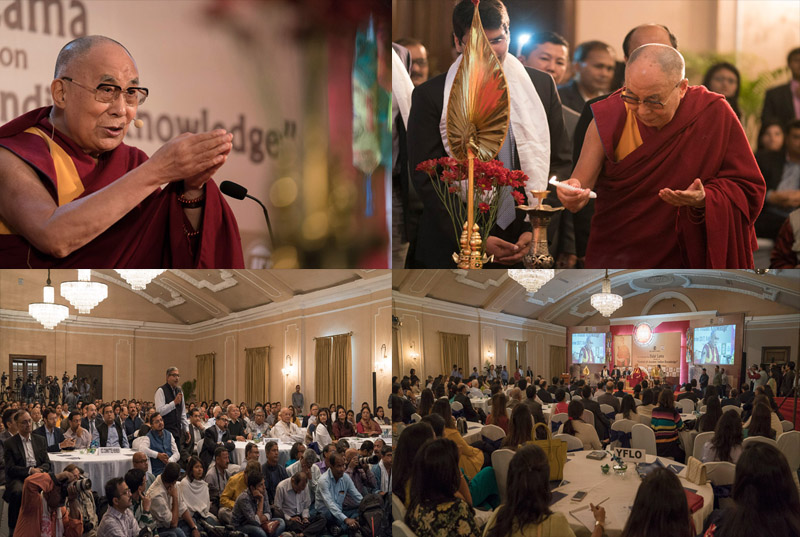Kolkata, India — His Holiness the Dalai Lama, while addressing the Indian Chamber of Commerce at Kolkata said that the world is facing a moral crisis. "Many of the problems we face today come about because we lack moral principles—we lack compassion."
 Kolkata, India — His Holiness the Dalai Lama, while addressing the Indian Chamber of Commerce at Kolkata said that the world is facing a moral crisis. "Many of the problems we face today come about because we lack moral principles—we lack compassion."
Kolkata, India — His Holiness the Dalai Lama, while addressing the Indian Chamber of Commerce at Kolkata said that the world is facing a moral crisis. "Many of the problems we face today come about because we lack moral principles—we lack compassion."
"One reason for this is that modern education is oriented to material goals with little time for inner values," the spiriutal leader of Tibet explained to over 250 members and guests of the Indian Chamber of Commerce in Kolkata, on November 23, 2017.
Speaking on the importance of compassion in today's world, His Holiness said that if we truly believed that other humans were like our brothers and sisters, we wouldn't let children die of starvation, or stand by while people killed each other as they do today.
The Tibetan spiritual leader remarked that the knowledge of how to deal with the cause of such problems by tackling our negative emotions already exists in India. His Holiness places great hope on India's ability to combine modern education with its ancient understanding of the workings of the mind and emotions.
He further explained that if the 21st century were to be more peaceful than the century that preceded it, it will be important to move beyond the archaic ways of thinking, "to forgo the inclination to meet problems and conflicts with a use of force a more humane approach is required". He suggested that a long term target should be a demilitarized world. "It won't happen in a hurry," he said, "but it's what we should aim for."
When asked how to apply the Buddha's advice in modern life, the Nobel Peace Laureate recollected a conversation with a Swami in Bangalore in which they both agreed that Buddhist and Hindu traditions have ethics, concentration and wisdom—shila, shamatha and vipashyana—in common. Many Indian traditions involve an inner transformation that His Holiness has described as breeding emotional hygiene.
"Whereas there is evidence that constant anger, hatred and fear undermine our immune systems, warm-heartedness and a compassionate outlook bring a smile to the face," he further added.
As a parting remark, His Holiness said, "Don't think there isn't much you can do. Change always begins with an inspired individual, who then influences ten others, who in turn may influence ten more—that's how ideas spread and change comes about."
His Holiness noted that in an increasingly globalised world, national boundaries have less significance than they did, like national boundaries are nowhere to be seen when viewed from space. He also reiterated his admiration for the spirit of the European Union, the placing of a common European interest before that of individual states. The Buddhist leader cited the fact that, in a historical precedent, peace has prevailed amongst members of the EU over the last 70 years.


![Tibet has a rich history as a sovereign nation until the 1950s when it was invaded by China. [Photo: File]](/images/stories/Pics-2024/March/Tibet-Nation-1940s.jpg#joomlaImage://local-images/stories/Pics-2024/March/Tibet-Nation-1940s.jpg?width=1489&height=878)















